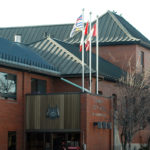Home »

BC Hydro preparing for impacts of drought
After a multi-year drought in in B.C., BC Hydro is encouraging customers to be prepared for weather-related power outages caused by drought-weakened trees and other vegetation as storm season begins.
While drought levels have improved compared to last year, BC Hydro meteorologists are warning there is still an elevated risk of power outages in the event of a windstorm this fall. This is especially true for Vancouver Island which has been under more sustained dry conditions, and in Northern B.C. where major wildfires occurred this season.
For the Lower Mainland and the Southern Interior, drought stress has been less severe this year; however, trees and other vegetation are still at risk compared to a year with average precipitation.
“A multi-year drought that began about three years ago is continuing to put local vegetation under stress damaging roots, trees, and soil in many parts of the province,” said Susie Rieder, BC Hydro spokesperson. “Trees weakened by years of drought can be more susceptible to wind and stormy conditions, and could be at risk of falling over, contributing to power outages.”
A new survey conducted on behalf of BC Hydro finds that about 50% of British Columbians think storms in the winter and becoming more severe, yet two-thirds of those surveyed do not think the drought will have an impact this storm season. BC Hydro storm season data indicates otherwise – drought was a major factor in some of the most damaging storms in recent years:
- 2022 windstorm: After a year of record drought, BC Hydro experienced a fall windstorm in early November that left about 420,000 customers in total without power in the Lower Mainland, Sunshine Coast, the Gulf Islands and Vancouver Island.
- 2023 fall windstorm: Similar to 2022, drought and a record-breaking wildfire season left trees and vegetation more susceptible to winds and heavy rain, leaving 235,000 customers without power in early November.
While storms have increased in frequency and severity in recent years, about half of British Columbians indicated they are not fully prepared for storm season this year. In fact, less than 40% have an emergency kit at home.
Those living in the Lower Mainland are the most likely to say they are concerned about the impact of storms on their personal safety and well-being (55%). They are also the most likely to think storms are becoming more frequent and severe (49%). However, when it comes to gearing up for storm-related power outages, the very concerned Lower Mainlanders are the least prepared.
In contrast, regions such as the North, the Southern Interior and Vancouver Island that experienced more drought and wildfire damage this year are less concerned about storm season, perhaps because they are more prepared. For example, more than 60% of residents living in the Southern Interior feel fully prepared for this storm season.
BC Hydro is prepared for this upcoming storm season, and it is encouraging customers to prepare as well.
No matter what region of the province they reside in, BC Hydro customers can prepare now in the following ways:

• Having a well-stocked emergency kit with water, flashlight, batteries, and non-perishable goods to last at least 72 hours, as well as a plan in place for your family in the event of an extended outage.
• Remembering the 10-metre rule – a downed line is an emergency, stay 10 metres back (about the length of a bus) and dial 9-1-1.
• Understanding there is often no way to tell if a power line is live – it will not likely be smoking, buzzing, or flashing.
For more information on how to prepare for storm season, visit bchydro.com/staysafe. BC Hydro’s outage checklist provides guidance on preparing your home for an outage and ensuring you know what to do before during and after a power outage.
e-KNOW file photo
BC Hydro







